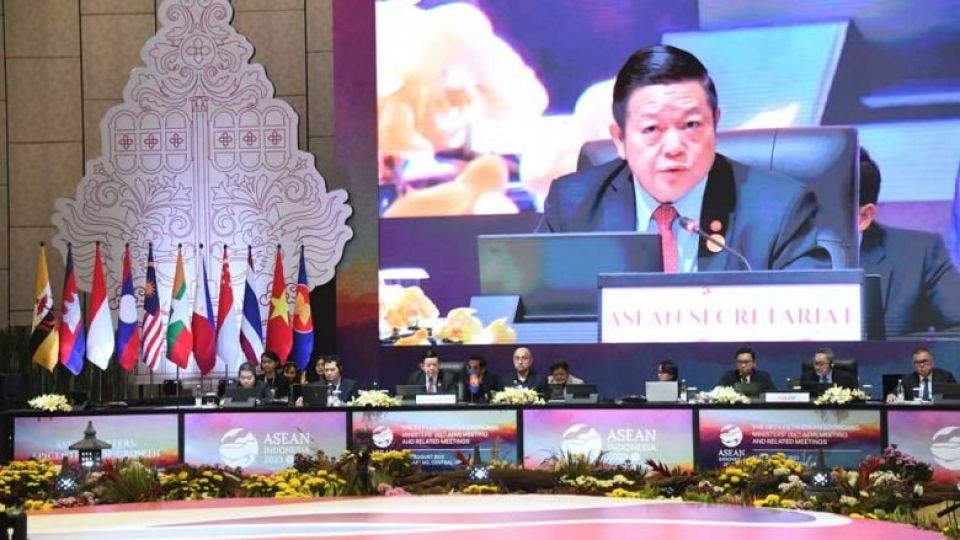August 21, 2023
PHNOM PENH – Geopolitical tensions could disrupt international trade and supply chain links, blocking efficiency gains derived from globalisation, ASEAN economic ministers (AEM) said at their 55th regional meeting.
They warned that the situation could result in “economic fragmentation and increased policy uncertainty, ultimately diminishing market confidence, reducing investment and adversely affecting long-term growth prospects in the region”.
As such, the ministers emphasised the need for resilience, deepening regional integration and advocacy for multilateralism of the ASEAN bloc in navigating the future economy of the region on the back of global uncertainties.
“While the ASEAN economy has demonstrated resilience amid the global economic landscape, policymakers must remain vigilant in mitigating risks that could undermine stability and impede future growth,” they said in a joint statement.
Themed “ASEAN Matters: Epicentrum of Growth”, the two-day meeting hosted by Indonesia as the bloc’s rotating chair, in port city Semarang, Central Java on August 19 touched on various issues straddling the region.
ASEAN secretary-general Kao Kim Hourn, in welcoming the progress of community economy building efforts, highlighted the importance of collective action to implement the decisions made at the meeting.
He said this was necessary to boost economic recovery, strengthen the region’s capabilities to take advantage of the ongoing digital transformation, and accelerate the achievement of its sustainable development goals.
ASEAN has reached an inflection point, where decarbonisation is paramount for the region’s continued economic growth, Kao mentioned.
The ASEAN Strategy for Carbon Neutrality would provide the springboard to propel our green transition forward, while unlocking huge economic potential for the citizens of the region,” he added.
According to a joint statement, the ministers reaffirmed their determination to promote regional economic integration despite ongoing challenges due to lingering disruption of supply chains, as well as high inflation and monetary tightening.
They lauded the robust growth of the ASEAN economy, which expanded by 5.7 per cent in 2022, driven by strong consumption, investment and trade.
The ministers also expressed optimism over Asian Development Bank’s regional growth projections of 4.6 per cent this year and 4.9 per cent in 2024, in addition to a positive outlook on the recovery of the services sector.
Trade and investments remained resilient in ASEAN as reflected by overall figures recorded by the bloc last year.
Total merchandise trade grew 14.9 per cent to $3.8 trillion due to the expansion of trade in fuel and electronic products while intra-ASEAN trade climbed 21.3 per cent year-on-year in 2022, representing 22.3 per cent of total ASEAN trade.
In terms of foreign direct investment (FDI), ASEAN registered a 5.5 per cent growth at $224.2 billion in 2022, on the back of investments in the services sector. The funds inflow accounted for 12.3 per cent of the total ASEAN FDI.
The region has seen a steady increase in tourist arrivals during the second half of 2022, with the total number of arrivals in 2022 amounting to 43.2 million individuals, a significant rise from the 2.9 million logged in 2021.
In that, ASEAN tourists contributed 49.7 per cent of the total arrivals, compared to 33.2 per cent in 2021.
Accordingly, the meeting anticipated a rebound in tourist arrivals from China, India, the US and EU, expecting that such an upturn will generate further positive spill-over effects on services and trade within the region.
Having said that, the ministers cautioned that while global inflation has declined, food and energy prices were unstable given the vulnerability stemming from the prolonged conflict in Eastern Europe.
There also remains the potential for an extended period of monetary policy tightening by major economies that could “adversely” affect prospects for global economic growth, the ministers mentioned.
But they maintained that the region’s banking sector remained stable.


